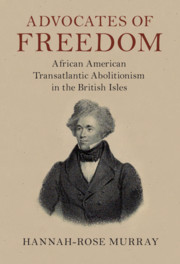Book contents
- Advocates of Freedom
- Slaveries since Emancipation
- Advocates of Freedom
- Copyright page
- Contents
- Figures
- Acknowledgments
- Dedication
- Introduction
- 1 “It Is Time for the Slaves to Speak”
- 2 “All the Bloody Paraphernalia of Slavery”
- 3 “[They Have] Not Ceased to Hold My Hand Since”
- 4 To “Frighten the Hyena Out of His Ferocity”
- 5 “I Would Much Rather Starve in England, a Free Woman, Than Be a Slave”
- 6 “Have No Fellowship I Pray You, with These Merciless Menstealers”
- 7 “My Name Is Not Tom”
- 8 “The Black People’s Side of the Story”
- Conclusion
- Bibliography
- Index
1 - “It Is Time for the Slaves to Speak”
Moses Roper, White Networks, and “Lying Inventions” 1835–1855
Published online by Cambridge University Press: 07 September 2020
- Advocates of Freedom
- Slaveries since Emancipation
- Advocates of Freedom
- Copyright page
- Contents
- Figures
- Acknowledgments
- Dedication
- Introduction
- 1 “It Is Time for the Slaves to Speak”
- 2 “All the Bloody Paraphernalia of Slavery”
- 3 “[They Have] Not Ceased to Hold My Hand Since”
- 4 To “Frighten the Hyena Out of His Ferocity”
- 5 “I Would Much Rather Starve in England, a Free Woman, Than Be a Slave”
- 6 “Have No Fellowship I Pray You, with These Merciless Menstealers”
- 7 “My Name Is Not Tom”
- 8 “The Black People’s Side of the Story”
- Conclusion
- Bibliography
- Index
Summary
Chapter 1 opens with Moses Roper’s lecturing tour in the British Isles. While not an invisible figure in historical scholarship, historians have rendered Roper peripheral in their discussions. Using new evidence, I uncover Roper’s previously unexplored performative techniques, and how he employed adaptive resistance with mixed success. He refused to compromise on his brutal descriptions of slavery, and his experience of torture proved either too upsetting for audiences or invited criticism. Since Victorian racial dynamics decreed that formerly enslaved individuals had to be supported by white networks, Roper’s lecture tour was hindered by his lack of white testimonials, and I analyze how white sabotage affected Roper’s tour. Therefore, his exploitation of the triad of performance, print culture, and abolitionist networks proved difficult compared to individuals such as Frederick Douglass.
Keywords
- Type
- Chapter
- Information
- Advocates of FreedomAfrican American Transatlantic Abolitionism in the British Isles, pp. 48 - 80Publisher: Cambridge University PressPrint publication year: 2020

